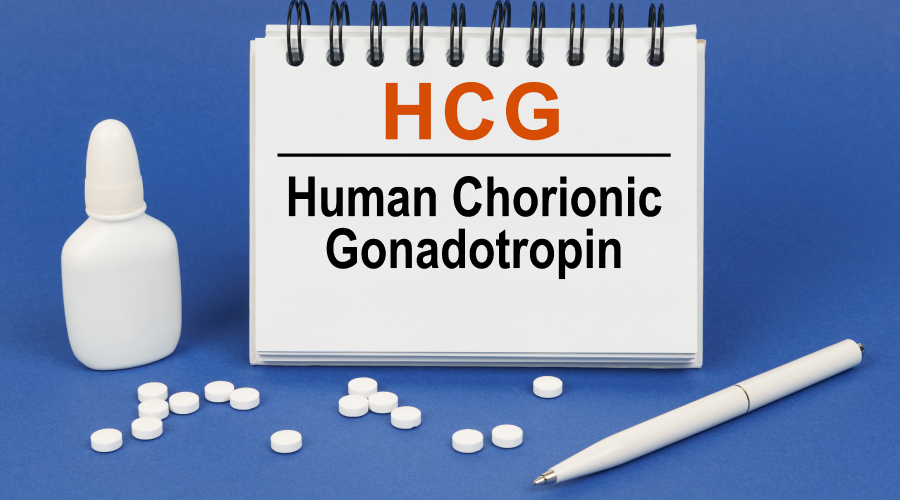

Human chorionic gonadotropin (hCG) is a hormone naturally found in the body, with a significant role during pregnancy. It is primarily produced by specialised placental cells and helps maintain pregnancy by stimulating the release of progesterone. Smaller amounts of this hormone are also present in the pituitary gland, liver, and colon.
Aside from pregnancy, hCG is used in various medical treatments. It supports fertility, helps regulate hormone levels, and treats certain health conditions (undescended testes) in young boys. In such cases, hCG therapy or injections may be recommended as part of a treatment plan. In this article, we will explore hCG therapy, its benefits, uses, risks, and how it should be administered.
What is Human Chorionic Gonadotropin (hCG)?
Produced by the placenta during pregnancy, Human chorionic gonadotropin (hCG) is a hormone that helps in detecting and maintaining the pregnancy by supporting the production of progesterone, a hormone needed to keep the uterus healthy.
How is hCG Used in Medicine?
Human chorionic gonadotropin (hCG) is used in various medical treatments, from pregnancy support to hormone therapy. Here are some key ways it is applied in medicine:
1. Human Chorionic Gonadotropin in Pregnancy
The hCG plays an important role in supporting the environment for the development of the foetus in pregnant women. The human chorionic gonadotropin test measures hCG levels in the blood or urine to confirm pregnancy. Doctors may also check beta human chorionic gonadotropin levels to monitor the health of a pregnancy, especially in severe cases of suspected miscarriage or ectopic pregnancy.
2. Human Chorionic Gonadotropin Injection for Fertility
Doctors prescribe human chorionic gonadotropin injections to help women who have trouble ovulating. It works by mimicking luteinizing hormone (LH), which signals the ovaries to release an egg. This treatment is often used in in vitro fertilization (IVF) and other assisted reproductive technologies.
3. hCG Therapy for Men
Human chorionic gonadotropin injections stimulate increased testosterone production specifically in male bodies. The medical community uses this product to treat hypogonadism which describes the situation when testosterone levels remain too low in the body. Male patients who use TRT alongside hCG injections preserve their sperm production and stop their testicles from shrinking.
4. Treating Undescended Testicles in Boys
Boys with cryptorchidism may receive hCG injections for treatment of this condition, which prevents their testicles from descending into the scrotum. Through this hormone’s effects, the testicles receive stimulation, which avoids required surgical intervention.
5. The Human Chorionic Gonadotropin Test for Cancer Detection
Doctors use hCG testing as a diagnostic tool to identify testicular cancer as well as ovarian cancer. A non-pregnant person with unusually elevated hCG hormone levels should consult medical professionals because it could signal a hidden medical issue.
HCG injections: A Game Changer in Fertility Treatments
HCG injections are a critical component of several fertility treatments. In women, HCG is employed to induce ovulation—i.e., to stimulate the release of an egg from the ovary in individuals who have trouble ovulating on their own. In males, HCG injections stimulate the release of testosterone and boost sperm count in male infertility.
How Do HCG Injections Work?
In fertility treatment, HCG injections are usually given once a woman’s eggs are mature enough for ovulation. The injection simulates the natural luteinizing hormone (LH) surge that tells the ovaries to release eggs. This aids in producing a more predictable and controlled ovulation cycle, increasing the likelihood of conception.
In men, HCG injections stimulate the production of testosterone and sperm by the testes. This can correct some causes of infertility due to low testosterone or inadequate sperm production.
Beyond Fertility: HCG and weight loss
The public has adopted the hCG diet as a weight loss method despite the absence of FDA approval. The dietary approach requires hCG hormone injections and permits consumers to eat between 500 to 800 calories per day. Research supports hCG hormone’s ability to diminish appetite while it helps users lose body fat without diminishing their muscle structure.
However, the research community has not identified solid scientific proof in support of these proposed claims. Scientists state that restricting calorie intake harshly leads to the wasting of muscles while causing fatigue as well as gallstones and nutritional imbalances. As per experts, HCG therapy should not be used for weight loss because it presents dangerous risks to health.
The Role of Beta hcg: Key Pregnancy Indicator
The b human chorionic gonadotropin hormone (β-hCG) is a specific type of subunit of hCG that is commonly measured during the pregnancy tests. It plays a critical role in early pregnancy detection and monitoring of fetal health. High or low levels of β-hCG can indicate complications in pregnancy.
How does this test work?
The HCG test is a urine or blood test that detects the level of beta HCG within your body. An elevated level of beta HCG is usually a sign of pregnancy. The test is commonly utilized to verify pregnancy, track early pregnancy, or diagnose specific medical conditions, e.g., ectopic pregnancies or molar pregnancies.
In non-pregnant women and men, high levels of HCG occasionally may be a sign of some medical conditions, such as some cancers. That is why the measurement of beta HCG levels is an important diagnostic tool in medicine.
Benefits of hCG Therapy
Regardless of being administered during fertility therapy, monitoring pregnancies, or potentially even helping someone lose weight (though with caution), there are many advantages that HCG therapy might possess. Here are a few:
- Supports fertility – In women, hCG therapy can stimulate ovulation, increasing the chance of getting pregnant. It is frequently used in treatments for infertility to support reproductive function.
- Pregnancy monitoring – During pregnancy, hCG is monitored to track the development and well-being of the pregnancy. The fluctuations in the levels can provide important information to doctors.
- Heightened testosterone production– In men, hCG is a natural hormone that stimulates the testes to release testosterone. This can benefit those with low testosterone levels or those who are infertile.
- Helps in weight control– There are some weight reduction programs that contain hCG, saying that it aids in fat reduction if taken with a very low-calorie diet. However, the medical community disputes its efficacy and safety for weight reduction.
Who Should Avoid hCG Therapy?
hCG therapy is not suitable for everyone. It is not recommended for people with:
- Hormone-sensitive cancers (e.g., breast, ovarian, prostate cancer)
- Uncontrolled thyroid or adrenal disorders
- Blood clotting disorders
- Severe heart or kidney disease
How is hCG Therapy Administered?
Healthcare providers administer hCG through two different injection methods: they insert it into the muscle (intramuscular) or under the skin (subcutaneous). The number of hCG doses and injection intervals depend on the specific medical treatment.
- For fertility treatments: hCG is injected at specific times in a woman’s cycle to trigger ovulation.
- For testosterone production: Men may receive hCG injections multiple times per week.
- For cryptorchidism: Boys receive a series of injections over several weeks.
Conclusion
Human chorionic gonadotropin therapy serves as a powerful medical treatment which supports fertility together with hormone regulation while treating various health issues. Medical professionals must supervise hCG administration because it requires careful use. To begin hCG therapy consult with a physician who will explain the benefits and risks and proper treatment methods.




